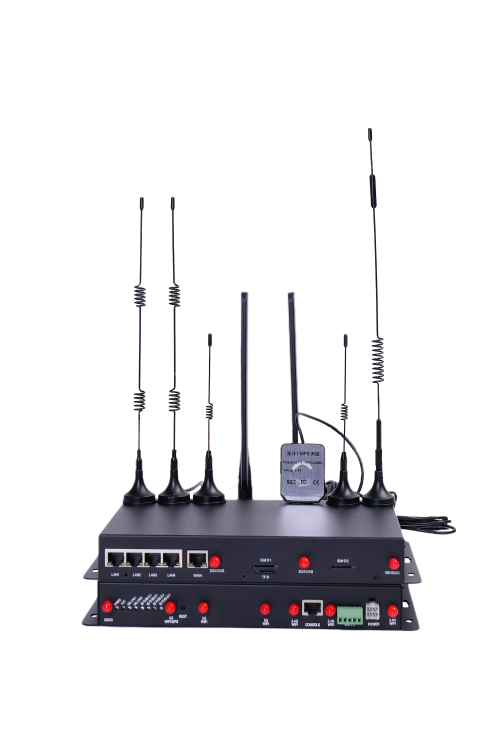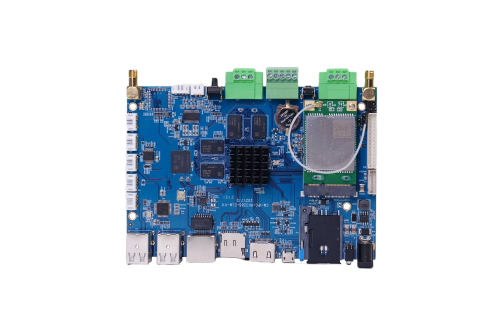Based on GPRS DTU Storage Tank Wireless Monitoring System Solution
Time:2019-01-09 Source:I. System Structure
The storage tank monitoring system based on industrial wireless network technology is mainly composed of on-site oil storage tank and control room. Each on-site storage tank body is equipped with a wireless differential pressure level transmitter, a wireless float level switch and a wireless temperature transmitter. The control room consists of a wireless host, a computer, a GPRS wireless data transmitter, a UPS, and a printer. The wireless host receives the signal of the field instrument. On the computer of the control room, the computer is equipped with the upper computer configuration software, which can view the topology view, network performance view, device data record and network parameter configuration of the entire network, and GPRS wireless data transmission. The machine is responsible for transmitting the data information of the wireless network to the mobile phone of other staff members through the wireless mobile phone base station.
The entire wireless network system consists of a data acquisition subsystem and a GPRS remote transmission subsystem. The data acquisition subsystem is mainly composed of a wireless host, a wireless differential pressure level transmitter, a wireless float liquid level switch and a wireless temperature transmitter. The main function of the wireless host is to perform wireless data communication on the entire network, and collect data of the collection terminal. The information is transmitted to the GPRS wireless data transmission machine, receiving the instruction from the upper computer and processing; the wireless differential pressure liquid level transmitter is installed in the lower part of the oil storage tank body, and the liquid level of the oil storage tank is measured by the differential pressure principle. And the liquid level data information is sent to the wireless host through the wireless signal; the wireless float liquid level switch is installed in the upper part of the oil storage tank body to prevent the liquid level from exceeding the maximum limit, plays the role of alarm, and passes the data information through the wireless signal. Send to the wireless host; the wireless temperature transmitters are installed in the upper, middle and lower positions of the tank, respectively, to measure the temperature of the different positions of the oil storage tank, and send the data information to the wireless host through the wireless signal. .
The main function of the GPRS remote transmission subsystem is to establish a remote communication connection between the control center and the data acquisition subsystem. Through the GPRS network, the data information of the oil storage tank can be sent to other staff mobile phones. They can view the mobile phone via WAP and short message. Real-time monitoring information of the storage tank and real-time monitoring of the storage tank.
II. System functions
The main functions of the tank monitoring system are as follows:
(1) System monitoring: real-time collection of oil level and temperature data of oil storage tanks, and real-time status can be viewed locally and remotely. The whole tank area and single tank dynamic graphic display, the whole process of oil and gas transmission tank monitoring and alarm Display, operation time, statistics and display of oil and gas data.
(2) Alarm record: In order to analyze the convenience of field equipment failure, the fault alarm record function can be set, and the liquid level and temperature threshold of individual oil tanks or multiple oil tanks can be set, and these operating parameters are used during operation. Cyclic over-limit monitoring, real-time recording of alarm events, alarm location, time of occurrence, alarm reason, and generate alarm table, can also be alarmed by SMS, WAP, configuration software interface and can set alarm mode and Stop the alarm, turn on the alarm and other functions.
(3) State trend analysis: The generation and display of the trend curve as an important part of the monitoring system can visually reflect the changes of some important working parameters. For example, the real-time and historical curves of the liquid level can be used to see the daily workload (inlet and oil) of each tank, so that it can be used to level the working time of each pump to achieve the purpose of extending the service life of the pump. The system supports real-time trend curves and historical trend curves such as monthly and daily liquid level and temperature for managers to analyze and make decisions.
(4) Database management: This system supports real-time database and historical database management of data information such as oil level, temperature and oil volume of oil storage tanks.
(5) System management: user management, rights management, data collection and transmission device management, device online state management, system configuration, etc.
(6) Network management: The whole system network is an intelligent self-organizing network. The field devices rely on battery power supply. After the equipment is started, it does not need to be manually configured to form a network.
III. Monitoring legend
(1) Monitoring software displays remote data on the screen
(2) According to the requirements of the user, the data is stored and made into various reports, graphs, trend graphs, histograms, pie charts, etc.

IV. System Features
Real-time performance, can achieve the purpose of real-time monitoring;
The use of wireless GPRS network reduces wiring costs and can better expand the network, which is conducive to system expansion;
The system is fully customizable, taking into account the needs of the user.
V. Summary
The use of GPRS DTU data module tank wireless monitoring and management system must also be strictly in accordance with the requirements of the process. Regularly check the equipment and pipelines on site and replace the gaskets regularly. In the event of an accident, reasonable plans, personnel escape routes, emergency self-help and other measures need to be publicized in advance to be prepared. In order to ensure the safety of personnel and ensure the healthy development of the company when the accident arrives.






